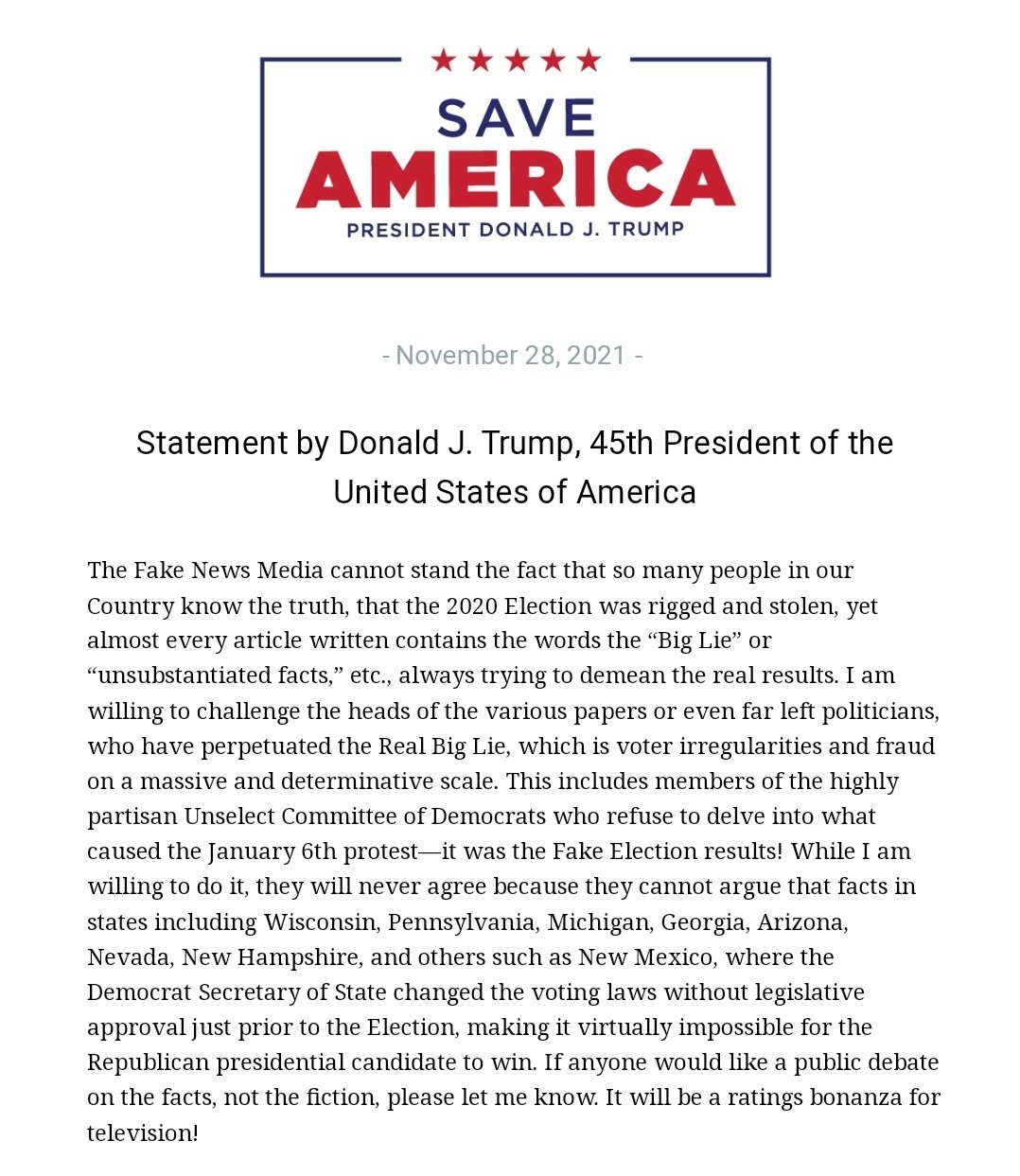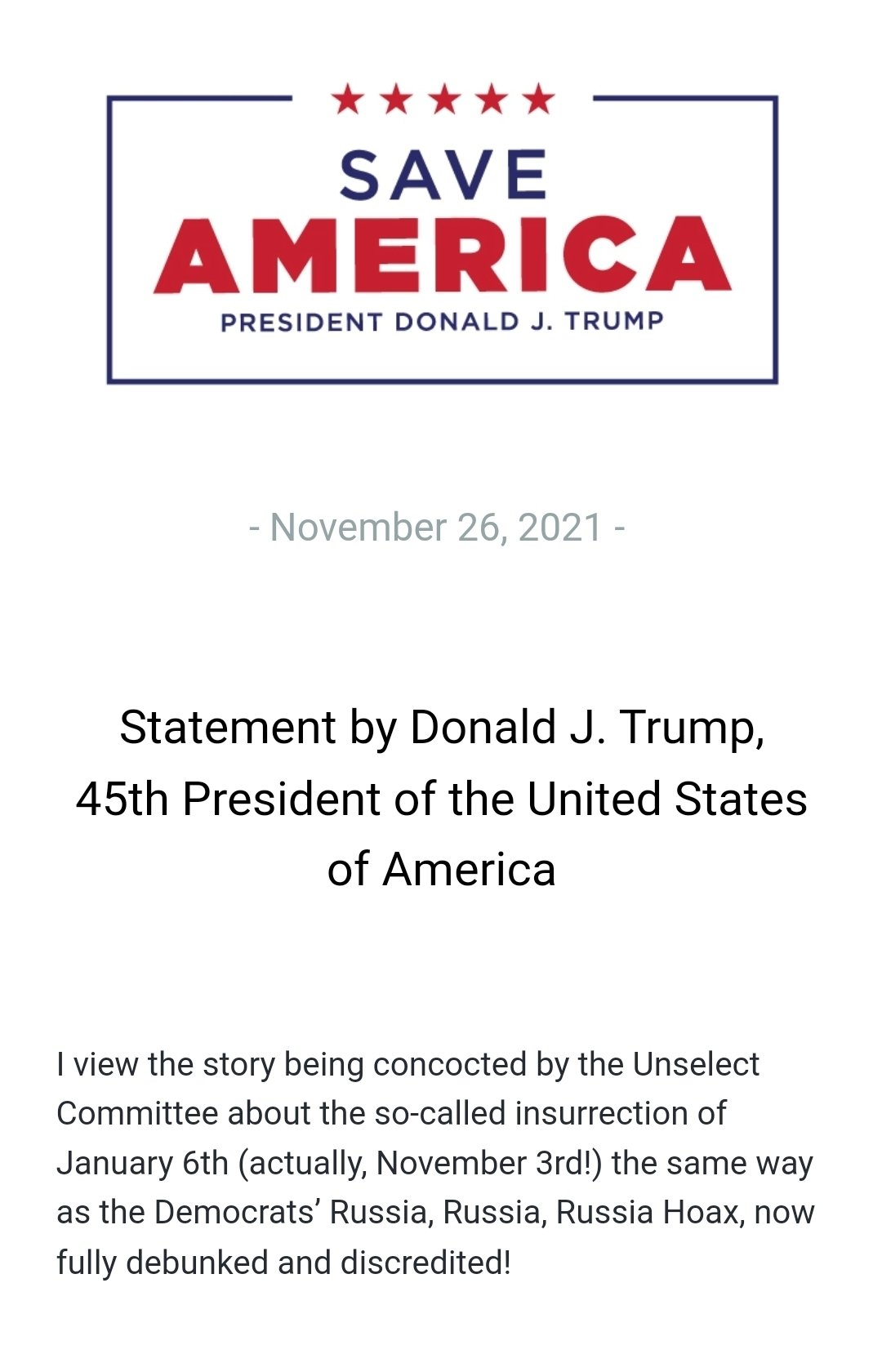The g(r)ift that keeps on giving: Charlie McCarthy’s cousin Kevin blamed Trump for the insurrection, as Eric Swalwell reminds us. Plus Kevin’s got some new problems with Marjorie Taylor Greene.
(01/13/2021)
House GOP Leader Kevin McCarthy called on President Donald Trump to “accept his share of responsibility” for the violence that overtook the U.S. Capitol last week and urged Republicans to accept that Joe Biden is the next leader of the nation.
“The president bears responsibility for Wednesday's attack on Congress by mob rioters,” McCarthy said on the House floor. “He should have immediately denounced the mob when he saw what was unfolding. These facts require immediate action by President Trump."
Rep. Matt Gaetz (R-FL) has a podcast now, called Firebrand. He was joined by fellow pro-Trump stalwart Rep. Marjorie Taylor Greene (R-GA), who weighed in on the growing battle within the Republican Party — suggesting that House Minority Leader Rep. Kevin McCarthy (R-CA) “doesn’t have the votes” to become speaker if the GOP flips the House in 2022.

Greene’s comments come on the heels of a recent report claiming that former President Donald Trump is keeping McCarthy on a short leash, leveraging his support for McCarthy’s speakership bid to keep him in line.
CNN’s Melanie Zanona wrote Wednesday that “if Trump were to publicly or even privately come out against McCarthy — or encourage someone else to challenge him — it would almost certainly create a math problem for McCarthy.”
Greene echoed that sentiment with Gaetz, saying, “We know that Kevin McCarthy has a problem in our conference. He doesn’t have the full support to be speaker. He doesn’t have the votes that are there, because there’s many of us that are very unhappy about the failure to hold Republicans accountable.”
www.mediaite.com/...


"You're covering somebody running in a system that is trying to undermine that very system."
- To political pressures add commercial ones. As everyone knows, Trump was good for ratings. Jon Karl said we in journalism can't be a conduit for the Big Lie. But if amplifying Trump is bad for the country, it can also be good (or safe) for the company. hollywoodreporter.com/news/general-n… 17/
- Everything I've said so far highlights the asymmetry between an anti-democratic candidacy, and a normal one (with normal flaws) for the Democrats.
- As I wrote 5 years ago: "Asymmetry between the major parties fries the circuits of the mainstream press." pressthink.org/2016/09/asymme… 19
- I would call Jon Karl a consensus figure within the US press. I don't mean a public consensus. I mean he's liked and respected by his peers. Seen by them as a "straight shooter." Past president of @whca, the White House Correspondents Association. And elected by its members. 2/
- A disclaimer to start. We do not know if Trump is going to run. Everyone around Trump says he will, Jon Karl reported. But he's not so sure.
- I'm not sure, either. Say he does not run. What are the chances of a Trumpified Republican Party and candidate in 2024? I would say high.
- Now let's turn to what Jon Karl said when Brian Stelter asked him: how do you cover a figure like Trump if he decides to run again? He gave several answers.
- "It's an immense challenge because you're covering— you're covering essentially an anti-democratic candidate."
- Bingo. 4/
- A caution: You probably had bingo about this years ago. But Jon Karl saying it on CNN still matters, I think. Why? Because ABC cannot credibly turn to its existing model for election coverage when its chief correspondent has said it: "essentially an anti-democratic candidate." 5/
- Second caution. I'm not saying the big national newsrooms won't do what they always do in covering a second Trump run. They might. But it won't be credible even to themselves for the reasons Jon Karl and Brian Stelter articulated on CNN.
- We know they know better, is my point. 6/
- About covering Trump if he runs, Jon Karl also said: "You're covering somebody running in a system that is trying to undermine that very system."
- Yes. And he's extremely likely to be running against a normal candidate operating within the election system, a glaring asymmetry. 7/
- Not only is Trump an anti-democratic force and clearly trying to bring down the system, but you know from the start he's "going to be perpetually lying," Karl said.
- "He is trying to repeat a lie so many times that people will believe it... we can't [be] a conduit for that." 8/
- Trying to imagine it, Karl took note of the normal practices that will break if Trump runs.
- "What does the debate look like with Donald Trump in it?"
- "You can't air Trump's speeches unfiltered as often happened in the 2016 campaign."
- "Interviews are incredibly challenging." 9/
- Again: the breakage is not new. What's striking is how slow the replacement work has been.
- Karl: "I don't really have the answer yet, except to say that we have to do what we always must do, and that is, pursue the truth and pursue it relentlessly and without fear or favor." 10/
- Here @brianstelter spoke up.
- "This is definitely the conversation that's starting to happen in newsrooms," Stelter said. "And I can hear it very loudly on the outside, critics asking these questions, but it is happening inside newsrooms as well."
- I did not know that. 😎 11/
- Not saying Brian is wrong. He has sources I lack. But I have seen no evidence that this conversation — given all we've learned about him since 2015, what the hell do we do if Trump runs again? — is meaningfully underway in American newsrooms.
- If true that certainly is news. 12/
- One thing seems clear. The old way, the model of election coverage that repeats itself every four years, is simply not viable if Trump runs.
- @brianstelter put it like this: "We know normal is not the answer, but we don't know necessarily what the answer might be." 13/
- An anti-democratic candidacy. A political figure trying to win back power by undermining the election system. The near certainty of a campaign based on the Big Lie— the lie that Trump won in 2020. Each poses major problems of principle AND practice for American journalism. 14/
- It would make a lot of sense for newsrooms like ABC and CNN to claim a much stronger public identity in 2024: pro-truth, pro-democracy, pro-voting. But for each there has to be a list: what we WILL do that we didn't do before, what we WON'T do that we routinely did before. 15/
- Each change in practice is likely to trigger controversy. New rules adopted because we know who Trump is by now will be demagogued by his supporters as one-sided journalism, designed to defeat one man.
- Easy to imagine their resolve melting as the "refs" get worked. 16/
- "Normal is not the answer."
- If that becomes the consensus view in journalism (and the interview with Karl suggests it already has, thus this thread...) then for newsrooms the work ahead is clear.
- If he runs again, our old model won't work. Where do we turn for a new one? 18/
- Circuits fried, the press will have to decide what to do: New wiring for its election coverage, or wing it and see what happens. It can also decide by not deciding.
- That would not be wise.20/
• • •
McCarthy responded:
"Look, same-sex marriage is the law of the land and it's what America holds and that's the law of the land."
"It's the law of the land. I support the law of the land. I don't see how that's different."
"I don't see how that's news."
McCarthy's response has been widely crticized as both non-commital and hypocritical.
Quite a few pointed out that McCarthy would be unlikely to issue the same defense of abortion rights, which the Republican Party has made clear it wants to restrict.


